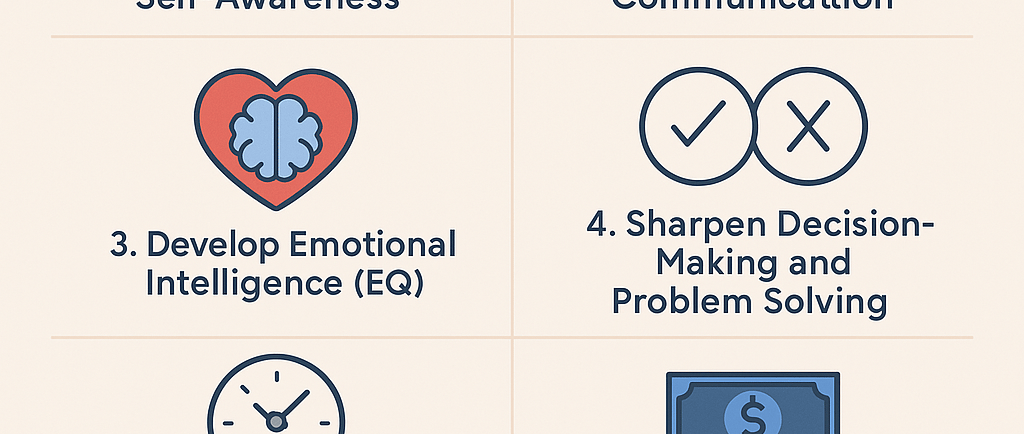How to Master Life Skills: A Blueprint for Lifelong Success


In the ever-evolving journey of life, mastering life skills is not just a luxury—it’s a necessity. Whether you’re navigating career choices, managing relationships, or pursuing personal growth, life skills form the foundation of success, resilience, and happiness.
But what exactly are life skills? And more importantly, how can you master them?
What Are Life Skills?
Life skills are the abilities and behaviors that help us effectively deal with the challenges of daily life. They includes
Communication
Decision-making
Emotional intelligence
Critical thinking
Time management
Financial literacy
Adaptability
Self-discipline
Mastering these skills enhances both your personal and professional life. Here’s how to start:
1.Begin with Self-Awareness
Before mastering any skill, know yourself. Understand your strengths, weaknesses, values, and triggers.
Tips:
Practice journaling.
Take personality assessments (e.g., MBTI, DISC).
Ask for feedback from trusted peer
Why it matters: Self-awareness lays the foundation for growth. You can’t improve what you don’t understand.
2. Master Communication
Communication isn’t just about speaking; it’s about connecting.
Tips:
Practice active listening—focus more on understanding than replying.
Read widely to expand your vocabulary and perspective.
Join clubs like Toastmasters or engage in public speaking challenges.
Why it matters: Great communication unlocks opportunities and builds strong relationships.
3. Develop Emotional Intelligence (EQ)
EQ is your ability to manage emotions—both yours and others’.
Tips:
Learn empathy: Put yourself in others’ shoes.
Pause before reacting emotionally.
Reflect on emotional triggers
Why it matters: EQ determines how well you navigate social complexities and manage stress.
4. Sharpen Decision-Making and Problem Solving
Your life is shaped by the decisions you make.
Tips:
Use frameworks like pros/cons lists or SWOT analysis.
Delay impulsive decisions; give yourself thinking space.
Break down big problems into smaller, solvable steps.
Why it matters: Good decisions save time, money, and emotional energy.
5. Master Time Management
Time is your most valuable, non-renewable resource.
Tips:
Use the 80/20 rule (focus on high-impact tasks).
Plan your day the night before.
Use tools like calendars, to-do apps, or time-Tips:
Why it matters: Time management gives structure, productivity, and peace of mind.
6. Build Financial Literacy
Money management is life management.
Tips:
Learn budgeting and investing basics.
Track your spending and set savings goals.
Read books like “Rich Dad Poor Dad” or follow financial education channels
Why it matters: Financial literacy leads to freedom and less stress.
7. Practice Self-Discipline and Delayed Gratification
Success is not about doing what feels good now—it’s about doing what’s right for the long term.
Tips:
Start small habits and build consistency (e.g., waking up early, daily reading).
Use the “temptation bundling” technique: pair boring tasks with fun rewards.
Set clear, achievable goals.
Why it matters: Discipline fuels habits, and habits shape your future.
8. Embrace a Growth Mindset
Believe you can learn anything with effort.
Tips:
Replace “I can’t” with “I’m learning to…”
View failures as feedback.
Surround yourself with people who push you to grow.
Why it matters: A growth mindset turns obstacles into stepping stones.
Final Thought: Mastery is a Lifestyle
Mastering life skills is not a one-time goal—it’s a lifestyle. It’s about consistently showing up, improving, and evolving. The most successful people in the world aren’t born with life skills—they build them, one deliberate step at a time.
Start where you are. Pick one skill today, and commit to mastering it. Your future self will thank you.
